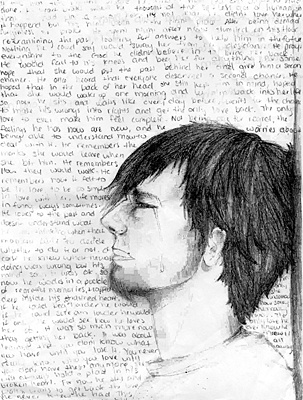All Nonfiction
- Bullying
- Books
- Academic
- Author Interviews
- Celebrity interviews
- College Articles
- College Essays
- Educator of the Year
- Heroes
- Interviews
- Memoir
- Personal Experience
- Sports
- Travel & Culture
All Opinions
- Bullying
- Current Events / Politics
- Discrimination
- Drugs / Alcohol / Smoking
- Entertainment / Celebrities
- Environment
- Love / Relationships
- Movies / Music / TV
- Pop Culture / Trends
- School / College
- Social Issues / Civics
- Spirituality / Religion
- Sports / Hobbies
All Hot Topics
- Bullying
- Community Service
- Environment
- Health
- Letters to the Editor
- Pride & Prejudice
- What Matters
- Back
Summer Guide
- Program Links
- Program Reviews
- Back
College Guide
- College Links
- College Reviews
- College Essays
- College Articles
- Back
Common Language MAG
My past feels fragmented as though I'm looking at it through shattered glass. But I think the truest part of the past is in the cracks, where adhesive memories hold the pieces together.
I was enrolled in the River School from kindergarten through second grade. The school's inclusion program for the hearing impaired enabled my first brush with irony: my affinity for words began with a girl who could not hear them.
We had reading time every day, and my group consisted of six students, two of whom were deaf. One, Sydney, drew my attention with her colorfulness – the palette of Saturday morning cartoons. In the quiet periods when everyone settled into their books, I would occasionally peek at the coiled apparatus in Sydney's ears. If she caught my gaze, she would giggle and a light flickered in her eyes. That light communicated, with the intensity of a lighthouse beam, a glimpse into her mind.
During recesses of Goldfish in paper cups and crayons, ripened baby teeth rattled under the volume of the messy conversation. But I only remember listening to Sydney. In her garbled speech, I could pick out few coherent words; the rest seemed like flourishes of a language only she knew. It was a language lacking consciousness of its own sound.
An externalization of her thoughts that transcended neatly sequenced consonants and vowels. A symphony of her mind.
This seemed like a salvation to me, a soft-spoken child who was starting to realize that many spoke just to hear the sound of their own voice. Sydney couldn't, and I wouldn't – even then I realized my sloppy syllables betrayed the shapes of my thoughts. Sydney and I began a written correspondence, and through the medium of crayons on napkins, we both found voices distinct from our speech. Our misspelled words, uneven spacing, and broken grammar felt less like betraying English than creating a language of our own.
I believe there are many more languages than people acknowledge. Take, for example, when I'm in a crowd and want to be left alone. I pretend to text on my phone, typing something like “adkjfnaks” repeatedly. There is a language to the nonsense I type: it communicates the imperative to either talk or appear distracted in social situations. But when the necessity of talking becomes a distraction in itself, people select words no more carefully than my thumbs select cell phone keys.
Also, during my quotidian Metro ride, the agreed-upon silence and the rehearsed, blank expressions of riders are a language of their own. Language too often conveys a fear of meaningful communication.
Writers distill the gratuities of language and inject meaning back into words. Spoken word sprouts dandelions that blow away with the wind, but written word builds bridges. Sydney and I managed to build a bridge with our crayons. I ran to the quiet of her world and she ran to the noisiness of mine. We pursued the experience of someone else's mind – its aesthetics and sound – to find commonalities. The bridges allow everyone's inner monologue to find an audience. But every bridge requires maintenance, which is why I must continue to write.
Sydney never knew this, but I never read the last page of our favorite book, The Giving Tree. When we reached the last page, I would watch her eyes speeding over the words. I could tell the story had ended when the light in them flickered out. That was my ending.

Similar Articles
JOIN THE DISCUSSION
This article has 0 comments.
